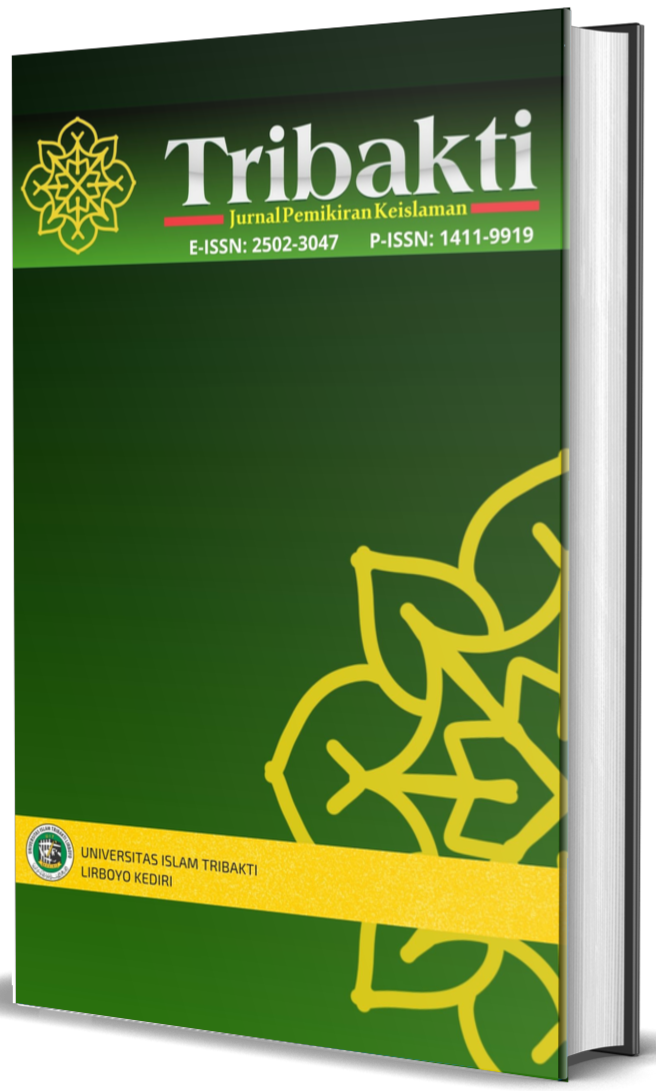Rethinking Islamic Feminist Thought on Reinterpreting the Qur'an: An Analysis of the Thoughts of Aminah Wadud, Fatima Mernissi, Asma Barlas, and Riffat Hassan
DOI:
https://doi.org/10.33367/tribakti.v35i1.4956Keywords:
Islamic Feminism, Qur'anic Reinterpretation, Critical Text Analysis, Gender InterpretationsAbstract
This article aims to revisit Islamic feminist thought on the reinterpretation of the Qur'an by analyzing the views of four major figures in the movement: Aminah Wadud, Fatima Mernissi, Asma Barlas, and Riffat Hassan. This study uses a critical text analysis approach to understand the arguments and interpretations they put forward in interpreting Qur'anic verses related to gender. Through an in-depth analysis of their work in articles, books, and papers of their views. In addition, the article explores the ways in which these Islamic feminists reconstruct an understanding of sacred texts, highlighting differences in approach and common themes in their interpretations. In addition, it evaluates the impact of their reinterpretations of the Qur'an on traditional views in Muslim societies and their implications in the context of social change and gender equality. When examining Islamic feminist views on the Qur'anic reinterpretation, it is important to thoroughly understand the cultural and linguistic context of Arabic. Misconceptions regarding the interpretations of classical Muslim intellectuals, which are often considered discriminatory against women, are often due to a lack of understanding of the cultural and linguistic context of Arabic. Therefore, it is important to pay attention to linguistic and cultural contexts when interpreting sacred texts. On the other hand, feminists should also note that interpretations of the Qur'an do not always result in interpretations that are in line with their principles of gender equality. The theoretical implication is that, in an effort to understand the verses of the Qur'an related to gender issues, it is important to consider the cultural context, language, and comprehensive interpretation. There is room for dialog and deeper understanding between feminist views and traditional interpretations, by taking an approach that combines an understanding of classical Arabic culture with the values of gender equality championed by feminists.
References
Abbas, Shahid, Ijaz Asghar, dan Ameer Sultan. “Evolution from Feminism to Postfeminism: Islamic Representation of Womanhood.” Research Journal of Social Science & Ecomomics Review 2, no. 3 (2021): 108–15. https://doi.org/10.36902/rjsser-vol2-iss3-2021(108-115).
Afsaruddin, Asma. Modern Rereadings Of The Qur’an Through A Gendered Lens. London: Oxford University Press, 2023.
Aḥmad, b. ʻAjībah. al-Baḥr al-Madīd fī Tafsīr al-Qur’ān al-Majīd. Bairūt: Dār al-Kutub al-ʻIlmiyah, 2002.
Ahmed, Mohammad Kaosar. “‘ Islamic Feminism ’: Is That an Oxymoron ? Common Misconception about Feminism,” no. January 2009 (2019).
Al-Aṣfahānī, Al-Rāghib. Tafsīr al-Rāghib al-Aṣfahānī. Mesir: Jāmiʻah Ṭanṭā, 1420.
Al-Azhar, Majmūʻah min al-ʻUlamā’ bi Ishrāf Majmaʻ al-Buḥūth al-Islāmiyah bi. al-Tafsīr al-Wasīṭ li al-Qur’ān al-Karīm. Kairo: al-Hayah al-ʻA̅mah li Shu’ūn al-Maṭābiʻ al-Amīriyah, 1393.
Al-Baghāwī, Al-Ḥusain b. Masʻūd. Maʻālim al-Tanzīl fī Tafsīr al-Qur’ān. Bairūt: Dār Iḥyā’ al-Turāth al-ʻArabī, 1420.
Al-Balkhī, Muqātil b. Sulaimān. Tafsīr Muqātil bin Sulaimān. Bairūt: Dār Iḥyā’ al-Turāth, 1423.
Al-Dīn, Kamāl, dan ʻAbd al-Ḥāmid Muḥammad. “Qawāid Taghlīb al-Mudhakar wa al-Muannath fī al-Qur’ān.” Majallah Kuliah al-Qur’ān al-Karīm Jāmiʻah al-Qur’ān al-Karīm wa al-ʻUlūm al-Islāmiyah al-Sudān, no. 7 (2016): 308–36.
Al-Ḥijāzī, Muḥammad Maḥmūd. al-Tafsīr al-Wāḍiḥ. Bairūt: Dār al-Jayl al-Jadīd, 1413.
Al-Qāsimī, Muḥammad Jamāl al-Dīn. Maḥasin al-Ta’wīl. Bairūt: Dār al-Kutub al-ʻIlmiyah, 1418.
Al-Rāzī, Fakhr al-Dīn. Mafātīḥ al-Ghayb. Bairūt: Dār Iḥyā’ al-Turāth, 1420.
Al-Samarqandī, Abū al-Layth. Baḥr al-ʻUlūm. Bairūt: Dār al-Kutub al-ʻIlmiyah, 1413.
Al-Shāfiʻī, Muḥammad b. Idrīs. Tafsīr al-Imām al-Shāfiʻī. Saudi Arabiya: Dār al-Tadmiriyah, 1427.
Al-Shaʻrāwī, Muḥammad Mutawallī. Tafsīr al-Shaʻrāwī. Mesir: Akhbār al-Yawum, 1997.
Al-Suyūṭī, Jalāl al-Dīn. al-Itqān fī ʻUlūm al-Qur’ān. Kairo: Maṭbaʻah Ḥijāzī, t.t.
Al-Zaylaʻī, Jamāl al-Dīn ʻAbd Allāh b. Yūsuf. Takhrīj al-Aḥādīth wa al-A̅thār al-Wāqiʻah fī Tafsīr al-Kashshāf li Zamakhsharī. Riyāḍ: Dār Ibn Khuzaimah, 1414.
AMIJEE, FATEMA. “How to Be a Feminist Muslim.” Journal of the American Philosophical Association, 2022, 1–21. https://doi.org/10.1017/apa.2022.9.
Anam, Wahidul, dan Mubaidi Sulaeman. “Reinterprestasi Hadis Mesoginik Kepemimpinan Wanita Dalam Musnad Ahmad Perspektif Maqasid Al-Shariah.” AL QUDS : Jurnal Studi Alquran dan Hadis 6, no. 3 (28 Desember 2022). https://doi.org/10.29240/alquds.v6i3.5172.
b. ʻA̅shūr, Muḥammad Ṭāhir. al-Taḥrīr wa al-Tanwīr. Tunis: al-Dār al-Tūnisiyah li al-Nashr, 1984.
Badran, Margot. Feminism in Islam: Secular and Religious Convergences. England: Oneworld, 2011.
Bahar, Ruqayya. “Islamic Feminism as a Rising Field of Inquiry in Contemporary Times.” South Asian Journal of Social Sciences and Humanities 02, no. 02 (2021): 101–10. https://doi.org/10.48165/sajssh.2021.2209.
Barlas, Asma. “Globalização da igualdade : a mulher,” 2012, 201–28.
———. “Muslim Women and Sexual Oppression: Reading Liberation from the Quran.” Macalester International 10, no. 1 (2001): 117–46.
———. “Still Quarrelling over the Quran: Five Interventions.” ISIM Review: International Institute for the Study of Islam in the Modern World 20, no. 1 (2007): 32–33. https://hdl.handle.net/1887/17203 Note:
Basri, Basri, dan Muhammad Muhammad. “Rethinking Religious Moderation Through The Study Of Indonesian Exegesis : A Study Of Tafsir Al-Azhar By Hamka.” Khazanah: Jurnal Studi Islam dan Humaniora 21, no. 1 (2023): 41–58. http://dx.doi.org/10.18592/khazanah.v21i1.8737.
Elhinnawy (she/her/hers), Hind. “The role of difference in feminist transnational solidarity: secular Muslim feminists in the United Kingdom and France.” International Feminist Journal of Politics 25, no. 4 (8 Agustus 2023): 593–614. https://doi.org/10.1080/14616742.2023.2206828.
Ghazanfari, A., S. D. Ramandi, dan A. Mirahmadi. “ Analysis of the Readings of Contemporary Commentators and Researchers of the Qur’an on the Social Status of Women. .” International Journal of Multicultural and Multireligious Understanding, 9, no. 4 (2022): 355-372.
Ghosh, H. A. “Dilemmas of Islamic and Secular Feminists and Feminisms.” Journal of International Women’s Studies 9, no. 3 (2008): 99–116.
Hamzah, Amri. Metode Penelitian Kepustakaan. Malang: Literasi Nusantara, 2020.
Hassan, Riffat. “Rights of Women Within Islamic Communities.” Religious Human Rights in Global Perspective, 1996, 361–86.
Hawwā, Saʻīd. al-Asās fī al-Tafsīr. Kairo: Dār al-Salām, 1424.
Hyder, Shafaque. “Global rise of Islamic feminism and its status.” Interdisciplinary Journal of Applied and Basic Subjects 1, no. 2 (2021): 1–13.
Ibn Kathīr, Ismāʻīl b. ʻUmar. Tafsīr al-Qur’ān al-ʻAẓīm. Riyāḍ: Dār Ṭayyibah, 1420.
Marnissi, Fatimah. The Veil and the Male Elite, A Feminist Interpretation of Women’s Rights in Islam. Inggirs: Perseus Books, 1999.
Mirza, Qudsia. “Islamic Feminism and gender equality.” International Institute of the Study of Islam in the Modern World 21 (2008): 30–32.
Moghissi, Haideh. “Islamic feminism revisited.” Comparative Studies of South Asia, Africa and the Middle East 31, no. 1 (2011): 76–84. https://doi.org/10.1215/1089201X-2010-054.
Muhammad, Muhammad. “Al-Ummi Dalam Al-Qur’an; Studi Tafsir Tematik Terhadap Literasi Nabi Muhammad.” Tribakti: Jurnal Pemikiran Keislaman 31, no. 1 (2020): 49–66. https://doi.org/10.33367/tribakti.v31i1.963.
———. Polemik Argumen atas Autentisitas Teks al-Qur’an Perspektif Ahl al-Sunnah. Disunting oleh Luttfi Fatahillah. I. Bandung: Bitread Publishing PT. Lontar Digital Asia, 2020.
Muhammad, Muhammad, Syarifatul Marwiyah, dan Ainur Rohmadani. “Pluralism in the Qur’an: Critical Analysis of Surah al-Baqarah 2: 62 Interpretation in Indonesia.” Dalam 4th Annual International Conference on Language, Literature and Media (AICOLLIM 2022), disunting oleh Rohmani Nur Indah, Miftahul Huda, Irham Irham, Muzakki Afifuddin, Masrokhin Masrokhin, dan Deny Efita Nur Rakhmawati, 725:609–17. Advances in Social Science, Education and Humanities Research. Paris: Atlantis Press SARL, 2023. https://doi.org/10.2991/978-2-38476-002-2_57.
Online, Cambridge Collections. “12 Women ’ s readings of the Qur ì an,” 2021, 255–72.
Osman, Ghada. “Back to Basic: The Discourse of Muslim Feminism in Contemporary Egypt.” Women and Language 26, no. 1 (2003): 73.
Philosophy, Islamic, Asma Abdu, dan Ambreen Salahuddin. “Implications of Feminist Thought on Understanding Qur ’ an : An Analytical Study” 3, no. 2 (2021): 41–50.
Rani, Zamila Abdul. “What Is Islamic Feminism? Promoting Cultural Change and Gender Equality Introduction: Feminism and Islamic Feminism,” no. 2 (2015): 978–967.
Retnani, Siti Dana Panti. “Feminisme Dalam Perkembangan Aliran Pemikiran Dan Hukum Di Indonesia.” Jurnal Ilmu Hukum: ALETHEA 1, no. 1 (2017): 95–109. https://doi.org/10.24246/alethea.vol1.no1.p95-109.
Ṣadiq Khān, Muḥammad. Fatḥ al-Bayān fī Maqāsid al-Qur’ān. Bairūt: al-Maktabah al-ʻAṣriyah, 1992.
Sarwar, Azam, dan Hong Zeng. “Breaking free from patriarchal appropriation of sacred texts: An Islamic feminist critique of Bol.” Asian Journal of Women’s Studies 27, no. 4 (2 Oktober 2021): 465–87. https://doi.org/10.1080/12259276.2021.1981526.
Sayyid Ṭanṭāwī, Muḥammad. al-Tafsīr al-Wasīṭ li al-Qur’ān al-Karīm. Kairo: Dār Nahḍah, 1997.
Shahin, Farah. “Islamic Feminism and Hegemonic Discourses on Faith and Gender in Islam.” International Journal of Islam in Asia 1, no. 1 (17 Desember 2020): 27–48. https://doi.org/10.1163/25899996-01010003.
Sulaeman, Mubaidi. “Reinterpretasi Hadist Mesoginik Tentang Penciptaan Wanita Dari Tulang Rusuk Laki-Laki.” El-Faqih : Jurnal Pemikiran Dan Hukum Islam 6, no. 2 (27 Oktober 2020): 18–37.
Tunku, Langgak, Off Jalan, dan Duta Kuala. “Feminisme Islami : Suatu Kritikan Terhadap Faham Keadilan Musawah 1 Conception Of Justice Md . Asham Ahmad Centre for the Study of Shari ’ ah , Law and Politics . Institute of Islamic Understanding Malaysia . No . 2 , Pendahuluan Feminisme secara ringkasn” 24, no. 1 (2022): 1–32.
Wadud, Amina. “Can one critique cancel all previous efforts?” Journal of Feminist Studies in Religion 32, no. 2 (2016): 130–34. https://doi.org/10.2979/jfemistudreli.32.2.21.
———. “Foreword.” International Feminist Journal of Politics 10, no. 4 (2008): 435–38. https://doi.org/10.1080/14616740802393858.
———. “Islam Beyond Patriarchy Through Gender Inclusive Qur’anic Analysis.” Wanted: Equality and Justice in the Muslim Family, 2009, 95–112.
———. “Reflections on islamic feminist exegesis of the qur’an.” Religions 12, no. 7 (2021): 1–11. https://doi.org/10.3390/rel12070497.
———. “Reflections on Islamic Feminist Exegesis of the Qur’an.” Religions 12, no. 7 (Juli 2021): 497. https://doi.org/10.3390/rel12070497.
Wadud, Amina, Kecia Ali, dan Farid Esack. “History and Politics of Islamic Feminism: A Comparison of the Works on Islam and Gender by.” Journal of Gender and Religion in Africa 18, no. 2 (2012): 89–107.
Winkel, Heidemarie. “Islamic Feminism. Thinking Gender Justice as a Religious Knowledge Practice.” Dalam Exploring Islam beyond Orientalism and Occidentalism: Sociological Approaches, disunting oleh Christel Gärtner dan Heidemarie Winkel, 179–210. Veröffentlichungen Der Sektion Religionssoziologie Der Deutschen Gesellschaft Für Soziologie. Wiesbaden: Springer Fachmedien, 2021. https://doi.org/10.1007/978-3-658-33239-6_8.
Published
Issue
Section
License

This work is licensed under a Creative Commons Attribution-NonCommercial-ShareAlike 4.0 International License.


 Abstract
Views:
982,
Abstract
Views:
982,  PDF downloads: 416
PDF downloads: 416


















